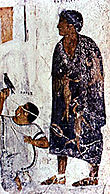
Roman triumphal honours
Encyclopedia

Roman Empire
The Roman Empire was the post-Republican period of the ancient Roman civilization, characterised by an autocratic form of government and large territorial holdings in Europe and around the Mediterranean....
to a victorious general in lieu of a full Roman triumph
Roman triumph
The Roman triumph was a civil ceremony and religious rite of ancient Rome, held to publicly celebrate and sanctify the military achievement of an army commander who had won great military successes, or originally and traditionally, one who had successfully completed a foreign war. In Republican...
.
After 14 BC, it became the policy of the founder-emperor Augustus
Augustus
Augustus ;23 September 63 BC – 19 August AD 14) is considered the first emperor of the Roman Empire, which he ruled alone from 27 BC until his death in 14 AD.The dates of his rule are contemporary dates; Augustus lived under two calendars, the Roman Republican until 45 BC, and the Julian...
, and of his successors, to grant full Triumphs only to members of their own ruling Julio-Claudian dynasty. As a substitute, victorious generals who were unrelated to the imperial house were awarded insignia (or ornamenta) triumphalia. That is, the dress and privileges traditionally granted to a triumphator, without the elaborate triumphal procession through Rome at the head of his troops.
Insignia
The honours included the right to wear triumphal dress in public: the corona triumphalis (a gold coronetCoronet
A coronet is a small crown consisting of ornaments fixed on a metal ring. Unlike a crown, a coronet never has arches.The word stems from the Old French coronete, a diminutive of coronne , itself from the Latin corona .Traditionally, such headgear is – as indicated by the German equivalent...
fashioned in the shape of a laurel wreath
Laurel wreath
A laurel wreath is a circular wreath made of interlocking branches and leaves of the bay laurel , an aromatic broadleaf evergreen. In Greek mythology, Apollo is represented wearing a laurel wreath on his head...
with dangling gold ribbons); an ivory baton
Baton (symbol)
The ceremonial baton is a short, thick stick, carried by select high-ranking military officers as a uniform article. The baton is distinguished from the swagger stick in being thicker and less functional . Unlike a staff of office, a baton is not rested on the ground...
; the tunica palmata (a tunic
Tunic
A tunic is any of several types of clothing for the body, of various lengths reaching from the shoulders to somewhere between the hips and the ankles...
embroidered with palm-leaves); and the toga picta ("painted toga"), a toga
Toga
The toga, a distinctive garment of Ancient Rome, was a cloth of perhaps 20 ft in length which was wrapped around the body and was generally worn over a tunic. The toga was made of wool, and the tunic under it often was made of linen. After the 2nd century BC, the toga was a garment worn...
which was dyed entirely purple with embroidered gold border, a robe believed originally to have been the official dress of the Roman kings. The only other Romans entitled to wear these garments were the emperor himself, the two Consuls in office and other magistrates when presiding over games.
In addition, a bronze statue of the beneficiary of triumphal honours was erected in the Forum of Augustus
Forum of Augustus
The Forum of Augustus is one of the Imperial forums of Rome, Italy, built by Augustus. It includes the Temple of Mars Ultor.-History:The triumvir Octavian vowed to build a temple honoring Mars, the Roman God of War, during the battle of Philippi in 42 BC...
. The beneficiary also had the right to display a further statue of himself in triumphal attire in the vestibule of his own house, which could also be displayed by his descendants.
Later history
Triumphal honours became debased in the latter part of TiberiusTiberius
Tiberius , was Roman Emperor from 14 AD to 37 AD. Tiberius was by birth a Claudian, son of Tiberius Claudius Nero and Livia Drusilla. His mother divorced Nero and married Augustus in 39 BC, making him a step-son of Octavian...
' rule and under Nero
Nero
Nero , was Roman Emperor from 54 to 68, and the last in the Julio-Claudian dynasty. Nero was adopted by his great-uncle Claudius to become his heir and successor, and succeeded to the throne in 54 following Claudius' death....
(r. 54-68), who awarded them to delator
Delator
Delator is Latin for a denouncer, i.e. who indicates to a court another as having committed a punishable deed.-Secular Roman law:...
s (spies used by these emperors to denounce out-of-favour senators for treason), as well as to military victors. But they were restored to distinction by Vespasian
Vespasian
Vespasian , was Roman Emperor from 69 AD to 79 AD. Vespasian was the founder of the Flavian dynasty, which ruled the Empire for a quarter century. Vespasian was descended from a family of equestrians, who rose into the senatorial rank under the Emperors of the Julio-Claudian dynasty...
(r. 69-79). Under the Antonines (98-180), the winners of triumphal honours lost the right to wear triumphal dress, which was now reserved for the Consuls and for the emperors themselves, but retained the privilege of a public statue.

